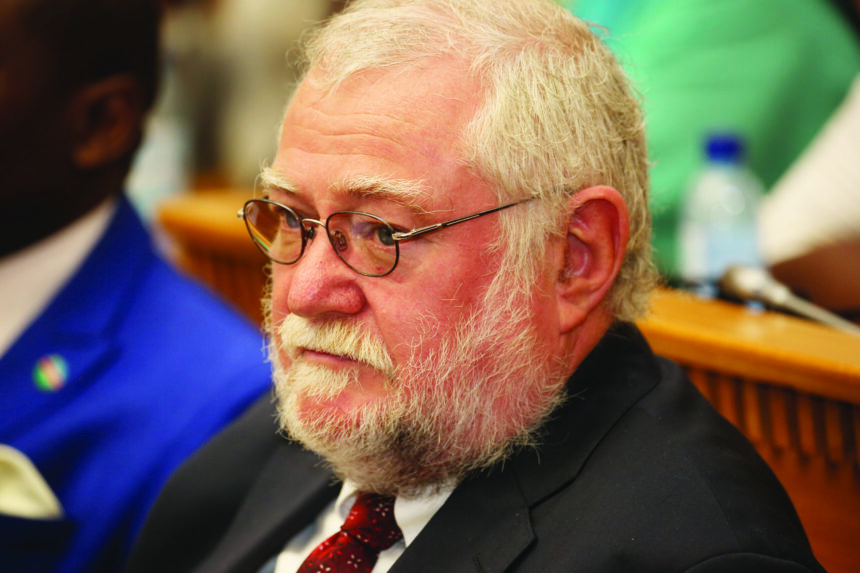Namibia is on the path to achieving food self-sufficiency through a robust plan to diversify and intensify agricultural practices.
This was stated by outgoing agriculture minister Calle Schlettwein.
Beyond 21 March 2025, he will hang up his political gloves after years of duty in the public service, first as a technocrat, deputy minister and then minister, roles many of his peers and observers alike believe were executed with dignity and honour.
Schlettwein outlined key achievements, persistent challenges and future plans in an exclusive interview with New Era.
The minister shared that efforts to shift from extensive, rain-fed farming to mechanised and irrigated agriculture are already showing promising results. “We have revived all the Green Schemes, and this year, for the first time in a long while, we planted 100% for the summer crops. Our goal is food self-sufficiency for grains and staples, and with the growth of the irrigation sector, this is achievable shortly,” he stated. The agriculturalist underscored the importance of diversification in the agricultural sector.
“Farms are no longer limited to traditional crop and livestock farming. We now see tourism, compliance activities, horticulture and grain production thriving alongside livestock farming. This diversification has brought economic growth to the sector,” he added.
The minister said when he assumed leadership of the ministry, the agricultural sector was in decline, with its contribution to the gross domestic product (GDP) shrinking. “I’m happy to say that we’ve turned that around. Agriculture is now writing positive figures, and I believe this growth will continue to increase,” he beamed. “Agriculture is the backbone of Namibia’s economy, with 70% of our people depending directly or indirectly on it. Every Namibian uses land and water in some form.”
The minister also emphasised diversification in agriculture. “Economic activities on farms now include tourism, horticulture, grain production and livestock farming. This has driven growth in a sector that was in a nosedive when we took over,” Schlettwein said, adding that the sector is now contributing positively to the GDP.
Challenges
Despite these successes, he expressed concern about the lack of public financial support for small-scale farmers. “Namibia is one of the few countries which still believes subsidies are unaffordable and unsustainable. Even the richest countries subsidise their farmers,” he observed.
The minister called for more direct financial support, subsidies for essential services like ploughing, seed provision and fertilisers, as well as a focus on manufacturing agricultural inputs locally. “Currently, we import all fertilisers and machinery. Addressing this dependency will be crucial for the future of agriculture,” Schlettwein noted.
He continued. “We must realise that subsidies and essential services are crucial for competitiveness and productivity.”
Water
He then detailed significant strides in water infrastructure, particularly in the central regions. “We saved the central area from running dry twice through timely emergency water provision schemes. We’ve embarked on a large infrastructure programme to create an integrated water supply system worth close to N$5 billion,” he said.
The minister highlighted progress in rural water supply through interconnected borehole systems. “We moved away from the concept of one borehole per village to linking several boreholes, ensuring resilience and security in water supply,” he continued.
Looking forward, Schlettwein revealed plans for a desalination scheme to address water demands at the coast. “This will stabilise demand for mining and surrounding communities,” he stated.
Land
On land reform, the politician acknowledged the lack of funding which hinders meaningful redistribution. “Land prices have escalated, and reduced funding means we can’t implement impactful redistribution. This must change,” he suggested. He pointed to the introduction of a new resettlement policy as a significant achievement. “The policy diversifies land use, enabling beneficiaries to acquire freehold titles and use land productively. Resettlement is now tied to economic opportunity, not just political need,” he said. Schlettwein furthermore highlighted the ministry’s success in repatriating displaced Namibians from Botswana, and creating new communal land. “For the first time, these communities have a place to call home, where they can live out their culture, traditions and rights.”
Way forward
Despite these achievements, he emphasised the need for continued efforts in funding, policy development and infrastructure.
“Agriculture, water and land reform are interconnected, and their success is key to Namibia’s future. I am proud of what we’ve achieved, but much remains to be done,” he added.


